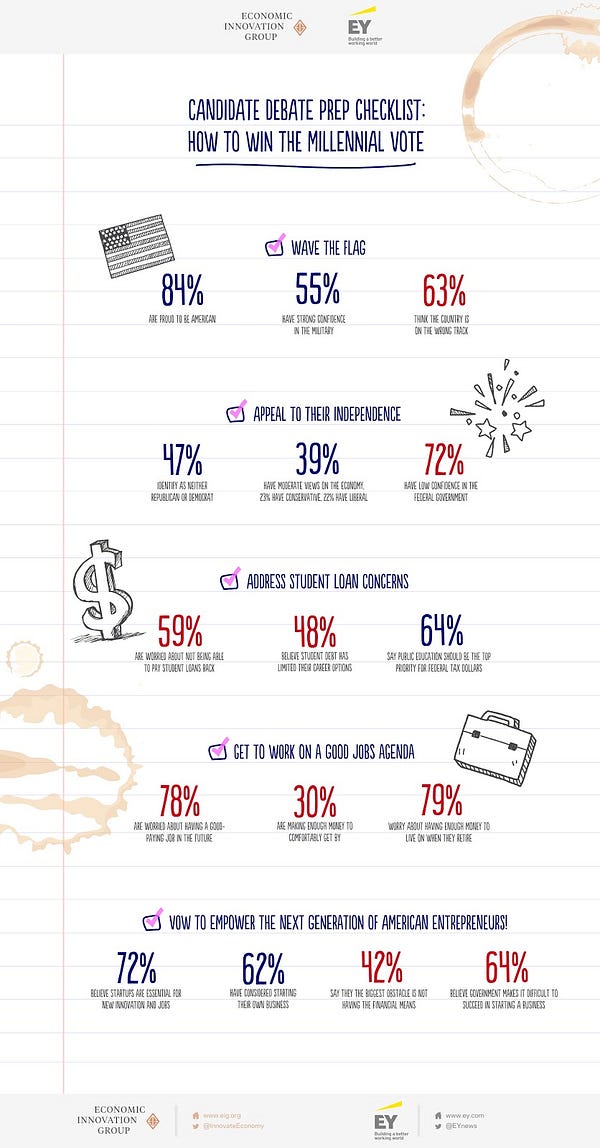
The Great Recession impacted Americans in many different ways: homeowners lost homes, pensioners lost savings, and investors lost entire portfolios. But what about those Millennials just beginning their higher education or entering the workforce during the downturn? The economic fallout hit both their wallets and their outlook on life. So perhaps it’s no surprise that Millennials remain in doubt regarding their financial future, American institutions, the value of a college degree, and their ability to start businesses. These days, an alarming 54 percent of Millennials believe their standard of living will be worse than that of their parents.
We’ve learned that Millennials harbor a deep distrust for many of the institutions that form the backbone of American society. Our recent national survey with EY found that their confidence in the Federal government, local government, news media, and corporate America all register below 30 percent. You can’t blame them — this generation has had a front row seat to remarkable levels of institutional dysfunction, corporate malfeasance, and unfiltered media sensationalism.
Lack of political affiliation is one sharp manifestation of institutional distrust: 47 percent of Millennials identify as Independent. Increasingly, Millennials’ political views do not fit within the confines of the traditional two-party system (only 27% identify as Democrats and 14% as Republicans). It’s not clear whether they genuinely disagree with the current party platforms, or if they are just generally skeptical of the establishment writ large. It is clear, though, that Millennials feel left behind by existing political institutions and are looking to policymakers to provide fresh solutions to the economic challenges they face.
Perhaps the greatest challenge facing this generation is the one-two punch of mounting student loan debt and stagnant wage growth. Thirty-four percent of Millennials have a college degree, putting them on track to be the most educated generation in American history. However, Millennials no longer see college as a surefire ticket to the middle class. With the combination of rising debt and lower wages, nearly half are skeptical that their investment in higher education will be worth the cost.
Anxiety has also made Millennials wary of starting their own businesses, despite their love for startups. In fact, while Millennials believe they are more entrepreneurial than past generations, they are on track to start proportionally fewer businesses than any generation on record. Policymakers can do more to support a pro-entrepreneur agenda that would open doors to Millennials, starting by making it easier for them to access capital to start new businesses. While almost two-thirds of Millennials have considered starting a business, 42 percent say they do not have the financial means to do so. One new idea that policymakers should look at closely is the bipartisan Investing in Opportunity Act, a bill that would help revitalize economically distressed communities through new incentives to connect investors with opportunities often overlooked in investor circles.
Despite these headwinds, Millennials themselves still hold out hope: 84 percent agree they are “proud to be American.” Those lawmakers and institutions that really understand what keeps Millennials up at night — and genuinely seek to address their concerns — will have the rare opportunity to earn the trust and loyalty of a generation of voters up for grabs.
Tonight, EIG, EY, and the Georgetown Institute of Politics and Policy will host a discussion on some of these issues impacting the Millennial vote. Speakers will include Steve Glickman, EIG’s co-founder and executive director, Cathy Koch, America’s tax policy leader at EY, Symone Sanders, former press secretary for Bernie Sanders, and Tim Miller, former communications director for Jeb Bush. The conversation will be moderated by Michelle Jaconi of the Independent Journal Review. We hope to see you there.






